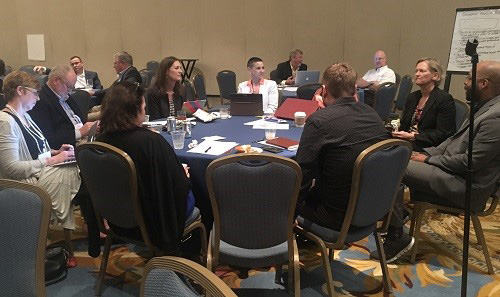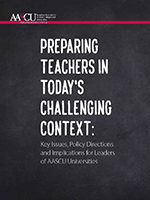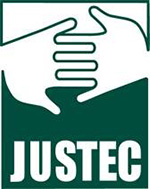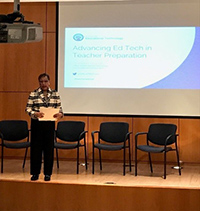27 Mar2017
By Christopher Koch

The following text is reposted with permission from the Council for the Accreditation of Educator Preparation (CAEP). The views expressed in this post do not necessarily reflect the views of AACTE.
My colleagues and I were pleased to attend the AACTE Annual Meeting. It was an opportunity to meet with, and listen to, many of you. Thank you for sharing your support, questions, and guidance with us.
We compiled answers to recurring questions we received during those conversations. We encourage you to share these answers with your teams and colleagues.
27 Mar2017
By Tim Finklea

It’s not just AACTE that needs your expertise as a volunteer (and we do – see our current call for volunteers!). The Council for the Accreditation of Educator Preparation (CAEP) is also looking for volunteers for various roles in the agency’s work. The CAEP applications are open now through April 1.
Please note that the CAEP call for service seeks a diverse population of educators, not only faculty from accredited programs; read more about the varied perspectives sought here. You can help represent the voice of educator preparation by applying for one of the following roles (links will open a PDF position description):
21 Mar2017
By Amanda Lester

In conjunction with the 69th Annual Meeting, AACTE hosted a daylong workshop March 1 titled “Strengthening Leadership Through Communities of Professional Learning Educational Leadership Preconference,” sponsored by The Wallace Foundation. The event was attended by higher education leaders from across the nation, who shared model strategies and identified priorities and actions needed to strengthen principal preparation across local contexts.
The agenda featured two interactive segments, both of which explored ways to renew principal preparation programs through collaborative action.
21 Mar2017
By Jolanda M. Westerhof

The American Association of State Colleges and Universities (AASCU) invites applications by April 21 for the 2017 Christa McAuliffe Excellence in Teacher Education Award. Only public colleges and universities that are members of AASCU are eligible to apply for the award, which honors exemplary teacher preparation and professional development programs.
To win this award, teacher education and professional development programs must –
17 Mar2017
By Julie Evans
AACTE is collaborating with Project Tomorrow to support that organization’s survey of preservice teachers, “Tomorrow’s Teachers Speak Up.” The views expressed in this post do not necessarily reflect the views of AACTE.
Tomorrow’s Teachers Speak Up is a unique opportunity for America’s next generation of teachers to share their ideas about how to leverage technology within learning, how they are being trained, and what they expect when they enter the classroom. The national data findings will be used to inform national policies on technology use in education, and to inform K-12 school and district leaders on the aspirations of tomorrow’s teachers.
Colleges, universities, and programs that register and promote the surveys to their students will receive the national data findings as well as their own institution’s results in June – for free.
14 Mar2017
By Kristin McCabe
This month, AACTE will host free webinars on incorporating content knowledge for teaching (CKT) into education course work, presented by experts from TeachingWorks (University of Michigan) and ETS® Educator Series (Educational Testing Service). Please join us March 29 for a focus on elementary English/language arts CKT and/or March 30 for elementary mathematics.
In each hourlong event, you’ll hear about and discuss approaches that can be used to engage preservice teachers with the kinds of content problems they are likely to encounter during their work as a teacher, such as in –
14 Feb2017
By Kristin McCabe

A new report from the Teacher Education Task Force of the American Association of State Colleges and Universities (AASCU) makes a compelling case for quality teacher preparation, capturing the key challenges that make the current context complex but also offering recommendations for both university leaders and policy makers to move the field forward.
The task force conducted a survey last year of presidents, provosts, and education deans at state colleges and universities to gauge the current state of educator preparation. (The survey results are included as an appendix to the new report.) The responses informed conversations among task force members to distill the core themes, debate their implications in light of the latest research, and determine consensus recommendations for priority actions by higher education administrators. The results were combined to craft the new report, and the AASCU policy team added a set of priorities for federal and state policy.
06 Feb2017
By Kristin McCabe

The 29th annual conference of the Japan-U.S. Teacher Education Consortium (JUSTEC) will be held September 14-17 at the University of Hawaii at Manoa. Although registration is not yet open, the submission site is ready for your paper and poster presentation proposals, due by April 5.
JUSTEC organizers seek presentations related to educator preparation in either country – or, better yet, related to collaborative research or exchange between the two. In particular, this year’s conference has three invited areas of interest:
24 Jan2017
By Mark LaCelle-Peterson
The demographic diversity of the teachers in America’s classrooms does not reflect that of the students they are teaching. In light of this persistent gap, many teacher preparation programs have bolstered their efforts – or developed new strategies – to recruit, admit, and support teacher candidates from underrepresented groups. Several AACTE member institutions are participating in a Networked Improvement Community (NIC) to boost the number of Black and Latino men in their teacher preparation programs, for example, and many others are at work in other national efforts and local partnerships.
Earlier this month, I was interested to learn of a related research project under way at Educational Testing Service (ETS) to explore efforts to diversify the teacher pipeline. As one part of this research, ETS hopes to identify successful strategies in postsecondary educator preparation programs and to help disseminate information to others. (AACTE is partnering with ETS to help support our members using performance assessments, but this research is not related to our partnership.)
17 Jan2017
By Rodrick Lucero
The U.S. Department of Education Office of Innovation and Improvement is offering free mentoring services for educator preparation programs to help design, implement, and improve teacher and principal development initiatives. State education agencies, school districts, and other organizations that are actively working to improve teacher and principal preparation or development are also encouraged to participate.
The services will be provided by nonprofit organizations that have received federal Supporting Effective Educator Development (SEED) grants and that are experienced in implementing educator preparation and professional development initiatives.
17 Jan2017
By Mark LaCelle-Peterson
The National Association of State Directors of Teacher Education and Certification held its annual Ted Andrews Winter Symposium January 4-6 in San Diego, California, convening educators from varied settings around the topic “Teacher Recruitment and Retention: Innovation Through Collaboration.”
The theme of partnership-driven innovation was reinforced through a number of sessions in which AACTE members presented along with colleagues from the PK-12 sector and from state education authorities. I was pleased to address the group on the topic of teacher recruitment policy and practice from providers’ perspective. Other notable sessions on the program included these:
17 Jan2017
By Jerrica Thurman
AACTE collaborated with the U.S. Department of Education Office of Educational Technology last month to host a 2-day summit focused on advancing educational technology in teacher preparation. Participants were chosen based on their pledged commitment to the “Educational Technology in Teacher Preparation Challenge” announced last fall.

AACTE President and CEO Sharon Robinson welcomes attendees to the Advancing Educational Technology in Teacher Preparation Summit.
More than 30 AACTE members and partners attended the first day of meetings in the AACTE building, with workshops highlighting how to develop a culture for active use of technology in teacher preparation programs; promote standards, competencies, and credentials for higher education faculty and preservice teachers in educational technology; and build a sustainable system of professional learning.
On the second day, participants visited the White House for the Advancing Educational Technology in Teacher Preparation Innovation Summit. The event highlighted the forward-thinking work of providers advancing the four principles of educational technology in teacher preparation as outlined in the 2016 National Educational Technology Plan:
10 Jan2017
By John F. Snyder
AACTE is partnering with the American Association for Employment in Education (AAEE) to increase input from educator preparation providers in the organization’s annual teacher supply and demand survey. The views expressed in this post do not necessarily reflect the views of AACTE.
The annual American Association for Employment in Education (AAEE) Educator Supply and Demand Report needs your input! If you have not already done so, please complete this year’s survey by January 27.
10 Jan2017
By Zachary VanHouten
On January 9, the Council of Chief State School Officers announced the four finalists for the 2017 National Teacher of the Year award. AACTE is proud to announce that each of the four finalists received preparation from a member institution. These year’s finalists teach in California, Maryland, Massachusetts, and Wisconsin.
06 Dec2016
By John E. Clark
The views expressed in this article do not necessarily reflect the views of AACTE.
I’m a high school teacher in Florida. I entered the profession through an alternative certification route after completing a 20+ year career in telecommunications. Beyond my standard college classes, my classroom-based preparation consisted of only 10 days of observation along with the creation and delivery of two practice lessons. I graduated as “highly qualified” and was hired immediately as a science teacher at the local teacher job fair.
If I were entering the profession now, especially coming from the business world, I would want a more effective teacher preparation experience than the one I had 10 years ago. Many experienced educators concur. Hope Street Group’s On Deck: Preparing the Next Generation of Teachers (a report released this spring) was the first study that compiled data collected by teachers from classroom teachers regarding their professional preparation. Along with 17 other National Teacher Fellows, I conducted this peer research, sourcing educators of all tenures who were certified in 49 states plus the District of Columbia. Amid several interesting findings in On Deck, two particularly resonated with me as I also reflect on “what I wish I’d learned then.”












